
vie-magazine-lennie-dimuzio-feature
He’s Got the Beat
By Tori Phelps | Photography courtesy of the DiMuzio family
After five decades of helping drummers hone their unique sounds, cymbal guru Lennie DiMuzio has written what will undoubtedly become known as the “Beat Bible”—a be-all, end-all book detailing the adventures (and misadventures) of the greatest drummers of the past century. Why him? Because he was there.
On the surface, Tales from the Cymbal Bag is a love letter from Lennie DiMuzio to the many members of his extended family known as drummers—not to mention people who just dig a good backbeat. But a closer look reveals that, at its core, Tales from the Cymbal Bag is the story of one man who was lucky enough to live what he loved every day and whose grand adventures brought him into contact with icons such as Buddy Rich and Max Roach—all of whom, as it turns out, thought Lennie was pretty iconic, too.
From Drummer Boy to Cymbal Man
If you’re not a drumming aficionado, you may not be familiar with the importance of cymbals. Don’t worry; Lennie will enlighten us in a minute. But first, a brief history lesson. As Tales from the Cymbal Bag points out, cymbals were among man’s earliest instruments. They’re thought to have existed in the Middle East for at least three thousand years; even the Bible references cymbals in Psalm 150.
Today, every cymbal is different, and it can be argued that they’re the biggest factor in determining a drummer’s sound. So, as a cymbal selector, Lennie’s fingerprints were all over an artist’s identity. “I became popular because I analyzed who the drummers were and what they were looking for,” he explains. “Then I gave them the information they needed to formulate their own unique style of playing. I helped them blend cymbals—not only with their drums, but with the way they played—to create an individual style. I created a signature for them.”
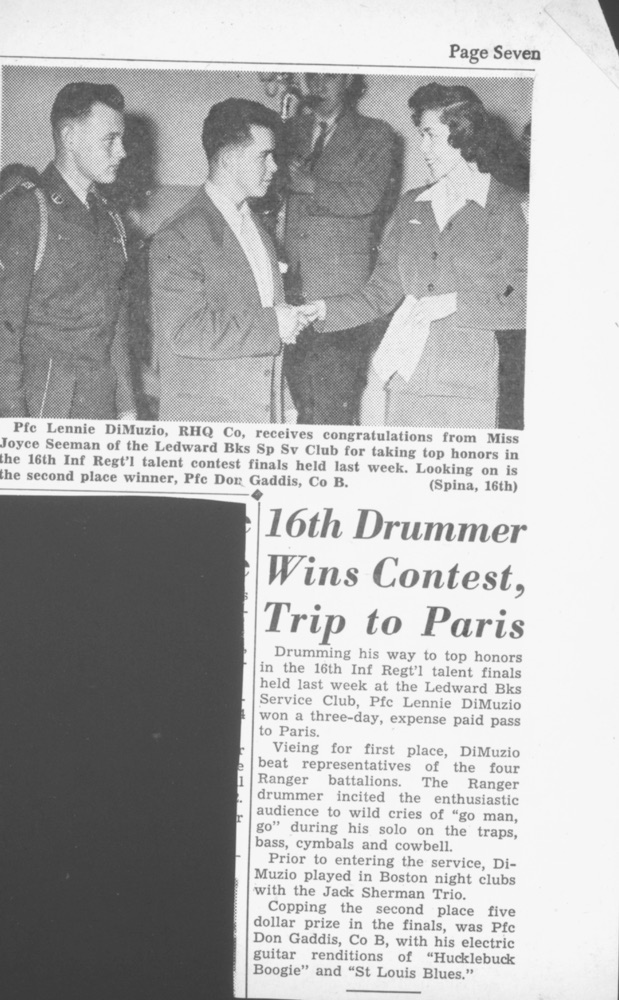
PFC Don Gaddis, PFC Lennie, Miss Joyce Seeman
Before long, Lennie and his saxophone-playing brother, Eddie, were performing in minstrel shows around New England and founding their own bands. Their steady rise was put on hold when the Korean War came calling, first for Eddie and then for Lennie. Even wartime couldn’t stop Lennie’s drumbeat, though, and he earned a spot in the Army band during his last year of service in Germany.
After he was discharged, Lennie enrolled at the New England Conservatory of Music, where he studied to be a teacher. But as he delved into it, while also working as a teacher on the side, he questioned that decision. “I didn’t really enjoy it,” he admits. “You have to give so much to teaching; it was very time consuming, and I wasn’t able to focus on my own career as a drummer.”
A transfer to the Schillinger House (now Berklee College of Music) allowed him to pursue a performance degree during the day and play with a band at night. During one of these gigs, he met Armand Zildjian, the son of Zildjian cymbal company owner Avedis Zildjian. The two hit it off immediately, and when Lennie inquired about openings at the company, Armand invited his new friend to meet his father. That meeting launched a forty-two-year career that took Lennie on the ride of his life.
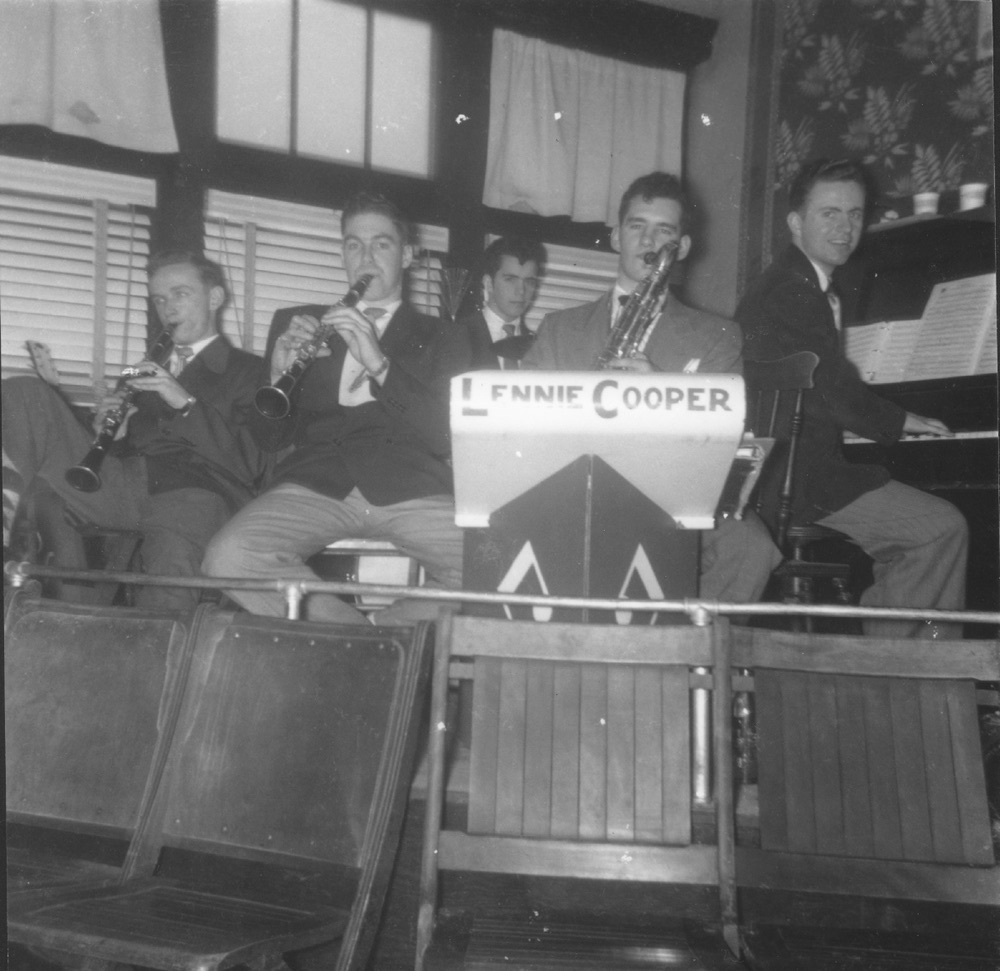
Lennie Cooper Band
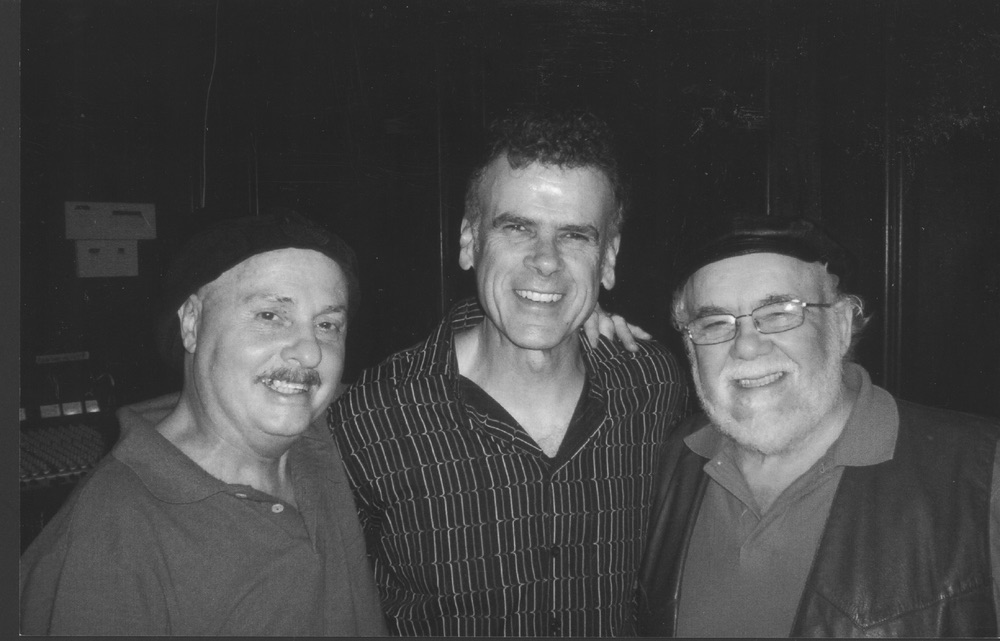
Paul Cellucci, David Garibaldi, Lennie
The Good Doctor
Though it was—and still is today—among the largest cymbal companies in the world, Zildjian was a fairly small company when Lennie came on board. Its size allowed Lennie to dip his toe into nearly every aspect of the business and rise to the top quickly. He was so enamored of this new career that he turned down the opportunity to audition for the legendary Woody Herman band, a move that took even Lennie by surprise.
The truth was that Lennie was happy at Zildjian and was becoming happier by the day. Along with working in areas such as advertising and design, Lennie spent a considerable amount of time in artist relations, a business segment he pioneered for the cymbal manufacturing industry. “Artist relations today are a very powerful thing,” Lennie says. “But in the old days, there was nothing like it, so I created it.”
While working in advertising and promotions, Lennie hatched a win-win strategy for Zildjian and the drummers the company worked with. He gave the artists the opportunity for publicity through print materials, clinic instruction, and performances. In return, they signed an agreement allowing Zildjian to use their names in its advertising.
Thanks to Lennie’s combination of natural charisma and business acumen, the concept was an instant success, and other cymbal companies took notice. “I knew all the artist relations people from other companies, and a lot of them leaned on me,” Lennie explains. “My policy became the policy throughout the industry, and today all the companies have artist relations managers.”
Innovative ideas aside, Lennie’s main area of expertise has always been cymbals and the drummers who use them. Thousands of drummers came through the Zildjian factory during Lennie’s four-decade tenure, and he built relationships with most of them. These were his people. This was his craft. And he was their go-to guy.
He modestly says that he met all the great rock drummers, but he did more than meet them. Lennie characterizes Aerosmith drummer Joey Kramer as “a good friend” of three decades. He’s longtime pals with David Lee Roth drummer Gregg Bissonette, with whom Lennie made some backstage memories that were nearly too risqué to put in his book. And then there was the time Lennie merrily shoved a lemon meringue pie in the face of Red Hot Chili Peppers drummer Chad Smith—just because.
The connections he cherishes most are the enduring ones—like his twenty-five-year friendship with Rush drummer Neil Peart. Peart, whom Lennie calls “a wonderful person and an excellent musician,” is considered one of the best rock ’n’ roll drummers of all time. He’s also a big fan of Lennie, even following him to the Sabian cymbal company ten years ago when, after a brief retirement, Lennie decided he wasn’t done with the business quite yet.
Dozens of other household-name drummers would say the same thing about the man they know as “the cymbal doctor,” “the good doctor,” or simply “the guru.” His daughter Cecilia explains, “He’s a specialist at his craft, and not a lot of people can do what he can. He has really exceptional ears that have allowed him to pick cymbals for all these drummers. Everyone wanted Lennie.”
That extended outside the cymbal factory as well. Another industry nickname for Lennie is “Jump Back,” a reference to his signature expression, “Jump back, baby!” Apparently the guru of sound was also the guru of good times. Lennie’s career included plenty of traveling, often to industry conferences where he became known for spearheading after-hours outings filled with laughter and high jinks. “I always had a group of drummers hanging with me,” Lennie says, “and they would constantly ask, ‘Where are we going tonight?’ One night I answered, ‘Jump back, baby.’ I think I meant it as, ‘Relax, we’re going out soon. And when we do, things are gonna happen.’ After that, ‘jump back, baby’ kind of became my thing.”
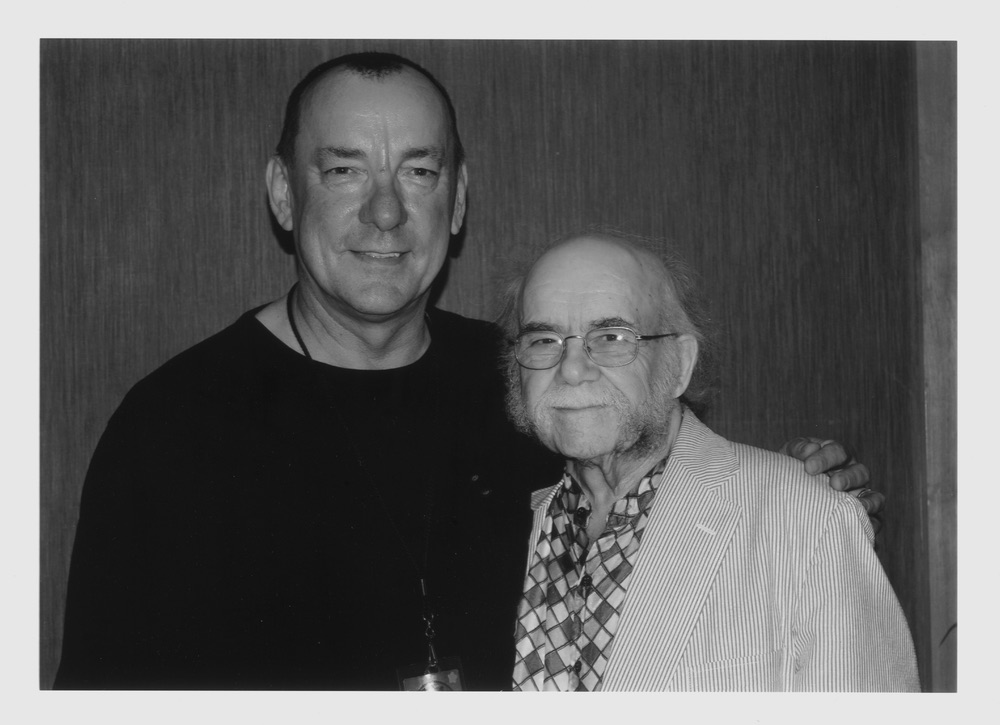
Neil Peart, Lennie
Poor, popular, in-demand Lennie—he was incredibly busy. And he loved every minute of it. “Being accepted as a close friend, given front row seats to their performances, having conversations where we talked about everything in the music business, and then helping them pursue their sound and their identity—that was the best part of the job,” he says.
It also makes for a great book.
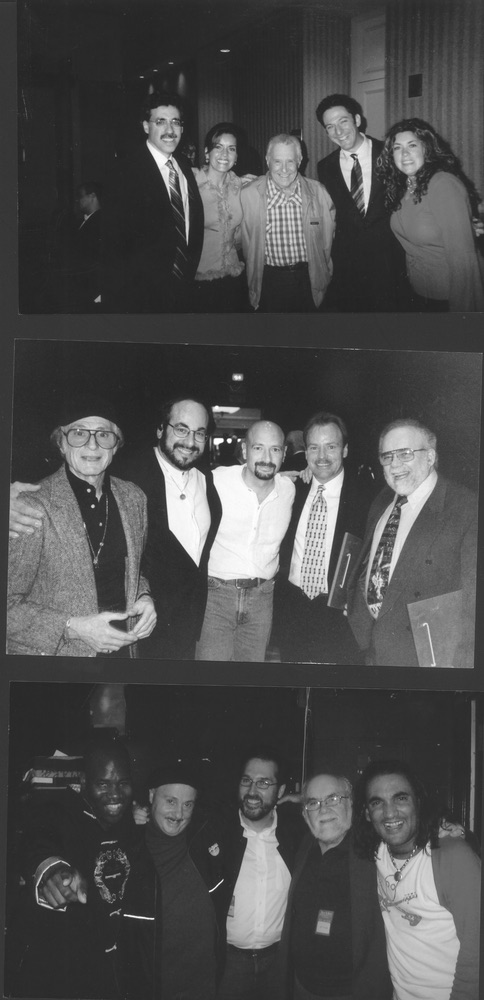
Tales from the Cymbal Bag
Lennie seems to have encyclopedic knowledge of every drummer you’ve ever heard of—and most of the ones you haven’t. Lennie knows, for example, that Whitesnake drummer Tommy Aldridge taught himself to play drums by mimicking Ringo Starr and Jimi Hendrix’s drummer, Mitch Mitchell. And that Ginger Baker, drummer in the classic rock band Cream, dreamed of becoming a professional cyclist but got a job in a band the first time he sat down at a drum set. This PhD in “drumology” didn’t come from a book. It’s the result of time spent and relationships built—not to mention adventures so unbelievable that they have to be true. Luckily, nearly all of them are recorded in Tales from the Cymbal Bag.
Included in the book is everything from how cymbals are made to stories like catching Frank Sinatra in the middle of a self-pep talk before a show. And the pictures. Oh, the pictures. Between Lennie’s always-ready camera and “chronicler of the drumming world” Lissa Wales, to whom the book is dedicated, they captured thousands of “right time, right place” photos. This visual feast of Lennie with his legions of famous friends and of iconic musicians performing and picking out cymbals at Zildjian makes readers feel like they were there, too.
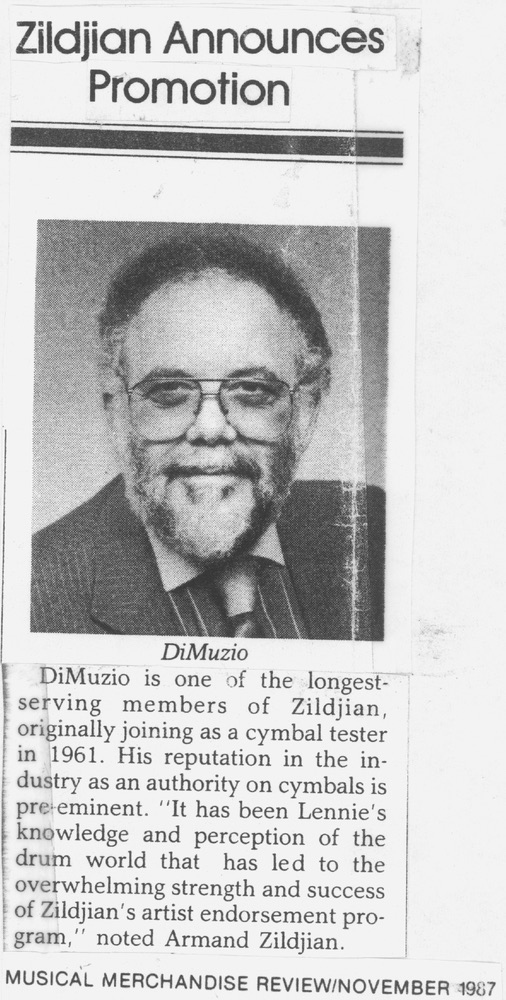
The idea for the book arose out of necessity. These stories had to be told, and everyone agreed it was Lennie’s duty to tell them. Thanks to his membership in countless music organizations and his attendance at thousands of concerts, clinics, and conferences, Lennie became an industry legend simply because he was there. “So many people asked me when I was going to write a book, and I would always say, ‘Someday,’” he says. “But then I started thinking about the younger generations who won’t know these stories and these people. There was nothing that said Gene Krupa was a nice guy who went to church on Sundays or that Buddy Rich was a bastard who was tough on kids.”
Yep, he goes there. All the way there. Lennie doesn’t apologize for shooting straight, and why should he? These are his stories, after all.
Heeding the call of history, Lennie teamed up with longtime friend and band director Jim Coffin, who offered a unique arrangement: Lennie would tell his stories into a tape recorder (he made about forty tapes), and Coffin would arrange his words into book form. The entire process took more than a decade, but the marathon was worth it. “The book gives people insight into what it was like to work with these great musicians and to be part of their lives,” Lennie says. “These are the masters who put down the roots, who created the formula of what it means to be a great musician.”
Not surprisingly, the experiences that are most memorable to him involve two of the greats: nice-guy Gene Krupa and obnoxious Buddy Rich. Lennie credits Krupa with being among the first to bring drums from the back of the stage to the front, featuring them as an instrument rather than just a timekeeper. “He gave the drums identity and personality,” Lennie says.
Krupa’s close friend (and biggest competitor) Rich, however, was in a category by himself. And not just because he could be insufferable. “He was a man from another planet; I believe we’ll never see another player like Buddy,” Lennie asserts.
He was a genius. He never read music, but he could hear something once and remember it forever. His playing was so far superior to anyone else’s, and he developed a style that lives on in every drummer today.
Tales from the Cymbal Bag also shines the spotlight on people who may not be famous, but who mean the world to Lennie—like his best friend, the late Armand Zildjian. As Jim Coffin writes about the twosome in the book, “You saw one, you saw the other.” Lennie says it was an honor to spend so much of his life working and playing with Armand, whom he calls his inspiration and the reason he has this treasure trove of memories.
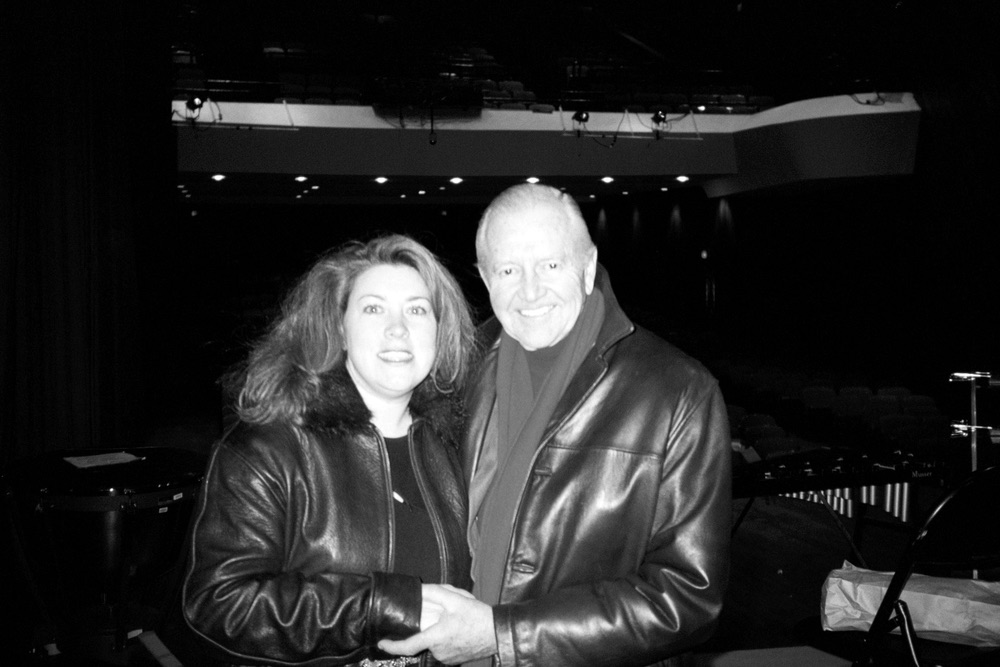
Therese DiMuzio, Vic Firth
Lennie’s family is on full display in the book, as well—mostly in photos, but they also make cameos in some of his stories. Especially present are his daughters, Cecilia and Therese, who followed their dad into the music business. Cecilia has been a singer and co-owner of the Boston-based band Stardust for twenty years. Therese is a drummer, vocalist, and DJ who has two musically gifted daughters of her own. Of his children’s pursuit of the family business, Lennie rhapsodizes, “It’s the most beautiful thing in the world. We’re very lucky that we can get together and share music with one another.”
She may appreciate the musical genes—and the many times she got backstage access to amazing bands—but Cecilia says Lennie’s legacy is about much more than that. “I haven’t met anyone who hasn’t loved my dad,” she swears. “He just has a way of winning people over, and he can find humor even in the bleakest times. He makes the best of every situation, even making everyone in the room laugh when he was going through chemo. That’s the kind of guy he is.”
The kind of guy Lennie is can be found on every page of Tales from the Cymbal Bag. You’ll meet a passionate man who has made a real difference not only in his children’s lives, but also in the lives of countless drummers. Ironically, the man who turned away from teaching may go down in percussion history as one of the greatest teachers ever—the kind who didn’t give you the answers, but who helped you find them yourself.
His latest assignment: “Read the book and learn about what life was like back in the day,” he encourages. “Enjoy the history. That’s the only thing I can ask for.”
— V —
You may request an autographed copy of the book by contacting Lennie DiMuzio by phone (781-837-8439) or by email (cccandbear@aol.com).
Share This Story!
KEEP UP WITH THE LATEST STORIES FROM VIE
















































































































































